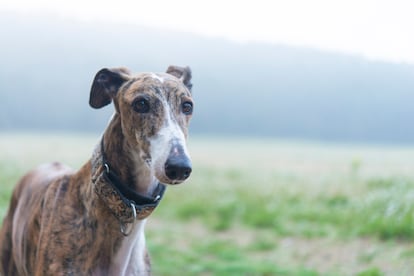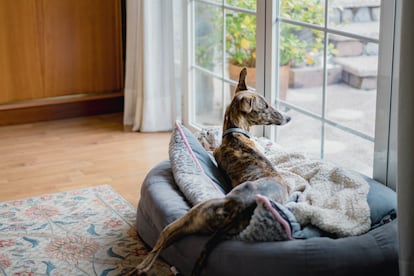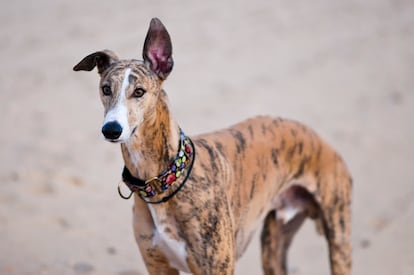Why greyhounds are ideal as home companions
The fastest dogs on the planet are sleepy, loyal, and homely. All they need to be happy and healthy is a few minutes a day to release their energy and a soft, warm place to rest

Don’t judge a book by its cover, but in the case of greyhounds, their unmistakable lean profile has meant that they are misunderstood by a lot of people. Their reputation as highly strung animals that need a lot of exercise often precedes them. However, nothing could be further from the truth. They are gentle, homely dogs that love to snooze for hours, although when they do decide to run, they are the fastest canines on the planet: they can reach around 60 kilometers (37 miles) per hour.
“In Germany they call them ‘big Spanish cats,’ because at home they are like sleepy cats, but on the street they run and play, although they do not need constant exercise,” says Cristina García, president of the NGO Galgos sin Fronteras [Greyhounds without Borders]. As a connoisseur of this breed, she highlights several reasons to adopt these dogs: “Out of sympathy, since it is a breed that needs a lot of help due to the abuse that they usually experience — some owners treat them like nothing more than a hunting tool, to be used and thrown away. Also, because they are noble, gentle, and loyal.”
This breed of dog, which Miguel de Cervantes chose as Don Quixote’s iconic companion, requires the same basic care as any dog: affection, good food, and company. “What makes them unique is that they usually come from situations where they haven’t known what being stroked is, so they need patience until they realize that their life has changed. Then they adapt and create a bond with their new family,” García says. What are these animals like when they have settled into their new home? “Wonderful, affectionate, and happy. They are called children of the wind, because when they are happy, they jump and do somersaults.”
Greyhounds are born sprinters and need to release their boundless energy for a few minutes a day. “The rest of the time they will want to lie down because they are lazy. They like to sleep in a soft, sunny spot, and they like to be comfortable, because they have very little body fat,” explains Anna Clements, co-founder of the SOS Galgos Shelter-School. She mentions some of their other peculiarities: “They are guided more by sight than by smell, so they can have a greater angle of vision of their surroundings from the sofa. They also often need the company of another dog to help them with separation anxiety when their owners leave the house.”
Helping a greyhound adapt to its new home

Greyhounds will acclimatize more easily to a new home when you can spend more time with them in the first few days after their arrival. “The ideal is to take a few weeks off work and gradually leave the dog alone for a few minutes each day, and lengthen the time so that they get used to the times they have to be alone,” Anna Clements recommends. And she adds: “When you leave them alone, you have to do it naturally, without saying goodbye. And, when you return home, ignore them when they receive you. It’s about rewarding them with attention when they are relaxed, not when they are restless, even if it is out of joy.” Usually, if the greyhound shares a home with another dog, it will be easier for them to adapt. “They are pack animals and feel happy when accompanied by other canines, which they will take as a reference, and will imitate their behavior,” Clements continues.
A healthy hound
The dogs’ characteristic thinness also determines how to care for them. “They have very thin skin as they have little fat and that is why they often feel cold, so it is advisable that they have a padded place to rest that will avoid injuries to the body, such as calluses,” Onintza Aguado, technical director of the Montepríncipe Veterinary Clinic in Madrid, says about their care.
Greyhounds have an athletic body and their diet should match their constitution. They need a feed with highly digestible protein that is also appropriate to their age, weight, and activity. “They are unique in that they are not dogs that eat large amounts and so it is important to avoid them becoming overweight because, having long and thin legs, they tend to suffer from joint problems,” continues Aguado. The veterinarian highlights the weak spots in the health of these dogs: “Hypertrophic cardiomyopathy, or having a very large heart, and periodontal disease or gingivitis caused by tartar accumulation.”
The current legal situation of greyhounds in Spain

The new Spanish animal protection law has not included dogs used in hunting activities, as is the case of greyhounds. “It is absurd that some dogs are protected and others are not. Greyhounds continue to be used as mere throwaway hunting tools and are bred in an uncontrolled manner,” laments the president of Galgos sin Fronteras. “The images of hanged, burned, and abused greyhounds have been seen around the world for many years. We are stigmatized by a minority sector that should be controlled in order to eradicate this problem,” Cristina García describes the image that Spain has abroad regarding the treatment of these dogs.
For years, animal protection associations have been denouncing the conditions in which greyhounds used for hunting are kept: “They live without adequate hygiene and in poor sanitary conditions. They are malnourished, kept alone, starved of affection, and beaten, which is why they end up developing anxiety around people,” describes SOS Galgos co-founder Anna Clements.
Sign up for our weekly newsletter to get more English-language news coverage from EL PAÍS USA Edition
Tu suscripción se está usando en otro dispositivo
¿Quieres añadir otro usuario a tu suscripción?
Si continúas leyendo en este dispositivo, no se podrá leer en el otro.
FlechaTu suscripción se está usando en otro dispositivo y solo puedes acceder a EL PAÍS desde un dispositivo a la vez.
Si quieres compartir tu cuenta, cambia tu suscripción a la modalidad Premium, así podrás añadir otro usuario. Cada uno accederá con su propia cuenta de email, lo que os permitirá personalizar vuestra experiencia en EL PAÍS.
¿Tienes una suscripción de empresa? Accede aquí para contratar más cuentas.
En el caso de no saber quién está usando tu cuenta, te recomendamos cambiar tu contraseña aquí.
Si decides continuar compartiendo tu cuenta, este mensaje se mostrará en tu dispositivo y en el de la otra persona que está usando tu cuenta de forma indefinida, afectando a tu experiencia de lectura. Puedes consultar aquí los términos y condiciones de la suscripción digital.









































